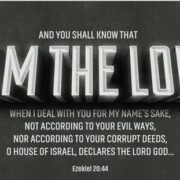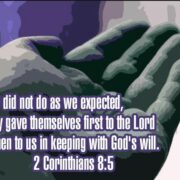THE CONTRIBUTION AND ALLEGIANCE OF THE LORD
In Ezekiel 20, , the Lord is speaking to the people of Israel through the prophet. He is talking about how the people would serve Him, and He shall require holy sacrifices and the finest gifts. The Lord also talked about a renewal of the covenant wherein all His promises would be reinstated.
40 People of Israel, you will all serve me,’ announces the Lord and King. ‘You will serve me on my high and holy mountain in Jerusalem. There I will accept you. I will require your offerings and your finest gifts. I want you to bring them along with all your other holy sacrifices. 41 I will bring you back from the nations. I will gather you together from the countries where you have been scattered. Then I will accept you as if you were sweet-smelling incense. I will show that I am holy among you. The nations will see it. 42 I will bring you into the land of Israel. Then you will know that I am the Lord. Long ago I raised my hand and made a promise. I promised to give that land to your people of long ago. 43 There you will remember your conduct. You will think about everything you did that made you “unclean.” And you will hate yourselves because of all the evil things you have done. 44 People of Israel, I will deal with you for the honor of my name. I will not deal with you based on your evil conduct and sinful practices. Then you will know that I am the Lord,’ announces the Lord and King.” ’ ” (Ezekiel 20:40-44)
Verse 32-44 is a form of disputation speech. The form used here is to make the speech a vehicle for the proclamation of salvation. However, despite the positive message of the proclamation, there is an interwoven announcement of partial judgment.
Your weekly dose of prophetic wisdom and anointing awaits you. Join our LIVE Conference Call!
1) Call 515-604-9266
2) Go to startmeeting.com, and use the login: BishopJordan
Have you ever believed and desired for a reaping without actually sowing anything?











